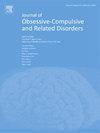对失去控制的消极信念的认知干预:对其他认知领域和强迫症症状的影响
IF 1.5
4区 医学
Q3 PSYCHIATRY
Journal of Obsessive-Compulsive and Related Disorders
Pub Date : 2025-06-12
DOI:10.1016/j.jocrd.2025.100966
引用次数: 0
摘要
目的失控信念是强迫症的一个新的认知领域。尽管越来越多的证据表明这些信念与强迫症症状有关,但目前尚不清楚针对失去控制信念的干预措施是否会导致症状改善。本研究旨在开发和测试在亚临床强迫症样本中,对失去控制信念进行短暂认知干预对强迫症相关评估和症状的影响。方法根据自我报告的强迫症症状和失去控制信念招募35名亚临床参与者,随机分组接受1小时针对失去控制信念(干预)或睡眠卫生(控制)的CBT治疗。在基线和干预后一周使用自我报告问卷评估失去控制的信念和强迫症症状。在为期两周的干预期间,还使用每日监测表格评估失控和强迫症相关评估。结果用日常监测表测量的失控和强迫症相关评价在条件和时间上存在显著的交互作用,干预组与对照组相比,从基线到随访的下降幅度更大。使用标准化的自我报告问卷对失去控制或强迫症症状的信念没有显著的相互作用。这些结果表明,将针对失去控制信念的策略纳入强迫症的CBT治疗可能是合理的,然而,可能需要更多的时间和/或疗程来实现更广泛的症状改善。本文章由计算机程序翻译,如有差异,请以英文原文为准。
A cognitive intervention for negative beliefs about losing control: impact on other cognitive domains and OCD symptoms
Purpose
Beliefs about losing control have been proposed as a novel cognitive domain in OCD. Despite increasing evidence that links these beliefs with OCD symptoms, it is unclear whether interventions targeting beliefs about losing control lead to symptom improvement. This study sought to develop and test the impact of a brief cognitive intervention for beliefs about losing control on OCD-relevant appraisals and symptoms in a sub-clinical OCD sample.
Methods
A total of 35 sub-clinical participants were recruited based on self-reported OCD symptoms and beliefs about losing control, and randomly assigned to receive a 1-h CBT session targeting beliefs about losing control (intervention) or sleep hygiene (control). Beliefs about losing control, and OCD symptom were assessed at baseline and one week after the intervention using self-report questionnaires. Appraisals of losing control and OCD-relevant appraisals were also assessed using daily monitoring forms during the two-week intervention period.
Results
There was a significant interaction between condition and time on appraisals of losing control and OCD-relevant appraisals measured by the daily monitoring forms, with those in the intervention condition showing greater reductions from baseline to follow-up compared to those in control condition. There were no significant interaction effects on beliefs about losing control or OCD symptoms measured using standardized self-report questionnaires.
Conclusions
These results suggest that incorporating strategies targeting beliefs about losing control into CBT for OCD may be warranted, however more time and/or sessions is/are likely required to achieve broader symptom improvement.
求助全文
通过发布文献求助,成功后即可免费获取论文全文。
去求助
来源期刊
CiteScore
4.00
自引率
5.60%
发文量
46
审稿时长
47 days
期刊介绍:
Journal of Obsessive-Compulsive and Related Disorders (JOCRD) is an international journal that publishes high quality research and clinically-oriented articles dealing with all aspects of obsessive-compulsive disorder (OCD) and related conditions (OC spectrum disorders; e.g., trichotillomania, hoarding, body dysmorphic disorder). The journal invites studies of clinical and non-clinical (i.e., student) samples of all age groups from the fields of psychiatry, psychology, neuroscience, and other medical and health sciences. The journal''s broad focus encompasses classification, assessment, psychological and psychiatric treatment, prevention, psychopathology, neurobiology and genetics. Clinical reports (descriptions of innovative treatment methods) and book reviews on all aspects of OCD-related disorders will be considered, as will theoretical and review articles that make valuable contributions.
Suitable topics for manuscripts include:
-The boundaries of OCD and relationships with OC spectrum disorders
-Validation of assessments of obsessive-compulsive and related phenomena
-OCD symptoms in diverse social and cultural contexts
-Studies of neurobiological and genetic factors in OCD and related conditions
-Experimental and descriptive psychopathology and epidemiological studies
-Studies on relationships among cognitive and behavioral variables in OCD and related disorders
-Interpersonal aspects of OCD and related disorders
-Evaluation of psychological and psychiatric treatment and prevention programs, and predictors of outcome.

 求助内容:
求助内容: 应助结果提醒方式:
应助结果提醒方式:


